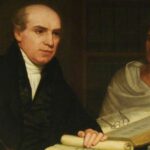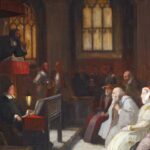For those of us who spend our time immersed in the discussions of reformed evangelicals in the English-speaking world, it can be helpful to listen to a very different voice from a different context. French Christian anarchist sociologist Jacques Ellul is such a voice. With intriguing book titles like The Technological Society, The Political Illusion, Violence, Propaganda, The Meaning of the City; and a practical life of involvement in the French Resistance, charitable activity, environmental activism and unordained church leadership. Ellul guarantees to give you a different way of thinking about the Christian faith and its interaction with the world around us. I want to highlight four themes to pique your curiosity: his views of technology, anarchism, Marxism and his approach to communicating with the secular world.
Ellul guarantees to give you a different way of thinking about the Christian faith and its interaction with the world around us.
Technology
Ellul is most well-known as a sociologist of technology, his work has even been called a kind of critical theory. He began writing about the pervasive impact on society of technology and technological thinking, in the 1950s, and his work was amazingly prophetic. Of course there are plenty of quaintly dated examples and comically inaccurate science-fiction predictions:
By the year 2000, voyages to the moon will be commonplace … all food will be complete synthetic … Sea water and ordinary rocks will yield all the necessary metals … Disease as well as famine, will have been eliminated … The problems of energy production will have been completely resolved.
… Knowledge will be accumulated in ‘electronic banks’ and transmitted directly to the human nervous system by means of coded electronic messages … natural reproduction will be forbidden.[1]
But overall, his predictions about the effects of the technological mindset on society ring true. Ellul coined the term ‘technique’ to describe the reality and the mindset of a society consumed by the practical efficiency of systems and machines: ‘Technique is the totality of methods rationally arrived at and having absolute efficiency.’[2] Technique is more than machines or technology in and of themselves, it is the culture and mindset that creates, and is created by, the increasing use of technology. The ‘technological milieu’ becomes a totally unavoidable, encircling system. He wrote very vividly about how much technique governs our very existence:
The machine tends not only to create a new human environment, but also to modify man’s very essence … to a universe for which he was not created. He was made to go six kilometres an hour, and he goes a thousand. He was made to eat when he was hungry and to sleep when he was sleepy; instead, he obeys a clock. He was made to have contact with living things, and he lives in a world of stone. He was created with a certain essential unity, and he is fragmented by all the forces of the modern word.
… He has been liberated little by little from physical constraints, but he is all the more the slave of abstract ones. He acts through intermediaries and consequently has lost contact with reality.
… The pilot of the supersonic aircraft at its maximum velocity becomes, in a sense, completely one with his machine. But immobilised in a network of tubes and ducts, he is deaf, blind, and impotent. His senses have been replaced by dials which inform him what is taking place.[3]
Furthermore, the mindset of technique means that spiritual and ethical purposes get lost, replaced by brute technological progress, which becomes the total justification:
Technique worships nothing, respects nothing. It has a single role: to strip off externals, to bring everything to light and by rational use to transform everything into means.[4]
Ultimately, it can be described as a kind of secular idolatry:
… man cannot live without the sacred. He therefore transfers his sense of the sacred to the very thing which has destroyed its former object: the technique itself.[5]
Today, we are completely immersed in the world Ellul warned about. His critical and pessimistic analysis of the rise and triumph of technique is a reminder, not just of the all-consuming nature of digital technology, but also of how it fosters a pragmatic, ends-justified-the-means, this-worldly mindset. At the most basic level, Ellul challenges us to assess our digital hygiene and monitor our screen usage.
Today, we are completely immersed in the world Ellul warned about.
He also challenges us to look at the way the mindset of technique might be dominating our attitude to money, parenting, church growth, denominational governance and political influence—you name it. It’s not that technology, or even technological thinking, is bad. Consider the ways that the internet can foster meaningful interpersonal connection and help with the spread of the gospel. Or the benefits of modern medicine. Or think of the godly wisdom that can lead us to develop strategies for evangelism, welcoming or leadership development in our churches. [6]
But we must be very wary of how the technologies we use and the larger pragmatic mindset can subtly distort our personal values; our relationships—whether in church, hospital or parliament house. It can even warp the emphases and implied content of the gospel message itself—to shift our hope away from God, the Spirit and and the kingdom to come.
Ellul counsels us to resist technique, where possible. As we discuss new church strategies, or catch ourselves personally in a thoughtless habit or routine, he would challenge us to pause and notice the negative influence of technique.
Ellul also stresses the importance of treating others as individuals, not merely ‘the mass’. He was, in fact, part of a loose philosophical school called Personalism, which ‘emphasizes the significance, uniqueness and inviolability of the person, as well as the person’s essentially relational or social dimension.’[7] Rather than merely seeking to control or manipulate others, Ellul says, Christians should seek to be in loving relationship and meaningful dialogue with others as individuals. We should be alert to the ways we slip into treating those in a call centre, or the members of our churches, as a faceless, generic mass. Each person is an individual and should be treated as such. We should speak up when we notice the depersonalising tendency of technique in our churches, businesses and public institutions.
Christian Anarchism
Anarchism has tended to be atheistic, or associated with nature spirituality. But Ellul insists that Christianity should be pacifist and non-hierarchical; that it has more in common with anarchism than Marxism (or even technologically-warped democracy).[8] He argues that violence is incompatible with the life of love that God requires, and observes that this was the majority Christian view, prior to the fourth century.[9] ‘Condoning violence means condoning every kind of violence,’ he writes.[10]
Thus he also argues against Just War Theory, especially for modern states, because it is impossible to know if victory is assured (especially with modern weapons). It doesn’t uphold a Christian concept of justice and it is impossible to love your neighbour in the heat of battle.[11] Ellul points to 1 Samuel 8, where God condemns Israel for their sinful request for a king, and the negative portrayal of Israel and Judah’s kings in the books of Chronicles.[12]
How does he address Romans 13, the major Bible passage that appears to contradict his position? He argues that, rather than endorsing the state, the passage is saying that Christians should submit to its flawed reality, recognising that the ruler is merely a servant of God.[13] He summarises his position on political power this way: usually Christians say that the state is legitimate unless it becomes unjust; by contrast he believes that the state is illegitimate unless it acts as a servant for the public good.[14]
Ellul rightly draws attention to the vast amount of biblical teaching that subverts, relativises and condemns human authority.
I believe Ellul over-corrects in all this, emphasising one part of the Bible’s teaching and drastically minimising another. It seems to me that the Bible makes a place for hierarchy and organised leadership in God’s original creation purpose and even, in some sense, in the new creation (e.g. Rev 5:10). In a fallen world, the justified use of force (as opposed to unjustified violence) has an important place—which Ellul concedes when he calls the state ‘necessary’ in this age.[15]
It is not clear to me that godliness requires Christians to remove themselves from all participation with the authoritative and coercive activities of human government. Anarchism can easily feed an antisocial, individualistic focus on personal freedoms. However, Ellul rightly draws attention to the vast amount of biblical teaching that subverts, relativises and condemns human authority. Those of us who have enjoyed a privileged place in relatively stable societies—and especially those of us who have grown up within theological traditions shaped by the so-called ‘Magisterial Reformation’ (such as Anglicans and Presbyterians), which sought to co-operate with civil authorities—need to be careful not to downplay this major Scriptural theme. Ellul’s warnings about the ways in which political and bureaucratic power has a tendency to expand, and keep expanding might seem timely in the age of lockdowns and curfews. One does not need to be paranoid or radicalised to want to hold the government and government agencies to account.
Ellul will also warn us off having overly ambitious and idealistic aims for human society in this age. We should look beyond this world for our hope for humanity. We can’t make this world a paradise; our goals should be more humble:
[W]hen we shake the edifice, we produce a crack, a gap in the structure, in which a human being can briefly find his freedom, which is always threatened … through our refusal, we keep the trap from closing all the way, for today. We can still breathe out in the open.[16]
Finally, Ellul helpfully highlights the corrupting effects of political power. Christians should therefore disassociate from militant and revolutionary movements, whether on the left or the right. And we should also be cautious about conservative and progressive approaches which focus and rely too much on the machinery of state power. Not only are the methods themselves problematic, but there is great risk that the Christian community be compromised and corrupted. Positively, Ellul stresses to us how valuable (and indirectly political) it is for Christians to simply live the authentic Christian life, in authentic Christian community. Not all political action needs to be directly entangled in the politics of the state.
Appreciative Critique of Marxism
From the beginning of his academic life, Ellul learned a great deal from Marx. He praises Marx’s opposition to oppression and his resistance to the worship of money and the constant pursuit of profit. He appreciated how Marx encouraged people to side with the poor and to be concerned with the concrete reality of life, not just abstract ideas. He believed that ‘Marx’s work actually gave him an important way to understand the world; and that it was impossible to be both a ‘Christian and a Marxist’.[17]
For Ellul, the purpose and direction to history lay beyond the material world of politics and technique.
Yet he considered Marx’s main concern, economic alienation, to have been eclipsed by the greater threat of technique.[18] In fact, he argued that both Marxism and capitalism shared the fundamental mindset of technique.[19] He thought Marx was too optimistic about the potential of human nature for selflessness, once people were granted freedom from oppressive social structures and false consciousness.[20] For Ellul, the purpose and direction to history lay beyond the material world of politics and technique.[21]
Ellul actually criticised modern democracy along similar lines, because of the dominance of technique and mass media and the reduction of everything to political solutions (what he called ‘politization’), it is hardly real democracy at all.
Communicating to the Secular World
Ellul’s writing roughly divides into secular sociological works and biblical theological works. A full appreciation of his thought requires a synthesis of both. In fact, Ellul often published pairs of books, exploring similar themes, from complementary sociological and theological perspectives. This approach allowed him to communicate his theologically-informed ideas for a broad secular audience and extend his influence beyond the Christian world. Wylie-Kellerman observes that ‘Eco-pagan anarchists to whom his analysis of the technological juggernaut has strong appeal, are often oblivious to, if not dumbfounded to, discover his biblical theology.’[22]
This is a model for Christian thinkers to consider imitating, though there are risks associated with it. It could possibly appear to be misleading or deceptive, and it could be tempting for those who are ashamed of being publicly Christian.
However, Ellul demonstrates that Christians do not need to be all-or-nothing in their social and political engagement—always putting our theological convictions front and centre. Perhaps we can present our ideas in a range of ways, and invite those who engage with us more fully to begin to explore our Christian faith with us.
Conclusion
I can guarantee that if you spend some time with Jacques Ellul you will find plenty to disagree with, even some statements that you find irritating or unfair. But I can also guarantee that you’ll find ideas that provoke you to further thought and personal reflection. You certainly won’t find his radical ideas and colourful turns of phrase boring! If you move in intellectual circles, maybe you could even start a Jacques Ellul reading group with a mix of Christian and non-Christian friends and acquaintances?
Further Reading/Listening
If you want to spend some time with Jacques Ellul, here are some places to start:
Jacob Van Vleet and Jacob Marques Rollinson have written a brief introduction to some of Ellul’s major works, choc-full of substantial quotes from the works themselves: Jacques Ellul: A Companion to His Major Works. Kindle. Eugene: Cascade Books, 2020.
Dr Laurie Johnson, professor of political philosophy at Kansas State University, has a series of YouTube videos walking through The Technological Society one chapter at a time. Keep an ear out for her cats occasionally meowing in the background. Starting here: https://www.youtube.com/watch?v=BqCKjzs4_4I accessed 14th September 2021.
You could start almost anywhere with Ellul’s actual works, but here are three possibilities:
The Technological Society is possibly the work Ellul is most well-known for.
The Meaning of the City is the theological companion piece to The Technological Society and so a good way to get a feel for how his sociological and theological books function together.
In the first chapter of Jesus and Marx: From Gospel to Ideology, Ellul gives an evaluation of Marxism and Christianity appropriate of Marxism. The final chapter is an exposition of Ellul’s own political philosophy: Christian Anarchism.
[1] Jacques Ellul, The Technological Society, trans. John Wilkinson (New York: Vintage books, 2011), 432–33.
[2] Ellul, The Technological Society, xxv.
[3] Ellul, 325–26.
[4] Ellul, 142.
[5] Ellul, 143.
[6] Dawn protests that Ellul is not technophobic, since he locates the problem with technique in human consciousness, not the technology itself (Dawn, ‘The Concept of ‘the Principalities and Powers’ in the Works of Jacques Ellul’, 246, 370.). So also ‘it would be stupid to think that Ellul is somehow against science, history, or even technology; what he is against is scientism, historicism and faith in technological progress. These are legalistic, ideological, or fundamentalist forms of religion, investing progress, science and technology with a sacred quality.’ (Jacob E. Van Vleet and Jacob Marques Rollinson, Jacques Ellul: A Companion to His Major Works, Kindle (Eugene: Casade Books, 2020), 105.). However, the lack of more positive examples of the use of technology and a framework for positive use gives an overall technophobic slant to Ellul’s work.
[7] Williams and Bengtsson, sec. 1. Williams and Bengtsson note that Personalism ‘has nearly always been united to Biblical theism.’
[8] Jacques Ellul, ‘The Paradox of Anarchism and Christianity’, The Ellul Studies Forum, no. 3 (June 1989): 6.
[9] Van Vleet and Rollinson, Jacques Ellul, 21–22.
[10] Van Vleet and Rollinson, 26. Quoting Ellul, Violence, 28.
[11] Van Vleet and Rollinson, 22–23; Jacques Ellul, Jesus and Marx: From Gospel to Ideology, trans. Joyce Main Hanks (New York: William B. Eerdmans, 1988), 38.
[12] Ellul, Jesus and Marx: From Gospel to Ideology, 165–66.
[13]‘It is ultimately a text of contestation and refusal.’ Jacques Ellul, ‘A Short, Complementary Note on Romans 13:1’, in Jacques Ellul and the Bible: Towards A Hermeneutic of Freedom, ed. and trans. J. M. Rollison (Eugene: Pickwick Publications, 2020), 152–54; Ellul, Jesus and Marx: From Gospel to Ideology, 169–71. He takes a similar position on Jesus teaching ‘Give to Caesar what is Caesars’: viz. his currency and nothing much more. Ellul, 166.
[14] Ellul, ‘The Paradox of Anarchism and Christianity’.
[15] ‘Political power and organization are necessities in society but only necessities.’ Ellul, ‘The Paradox of Anarchism and Christianity’.
[16] Ellul, ‘The Paradox of Anarchism and Christianity’.
[17] Van Vleet and Rollinson, Jacques Ellul, 92.
[18] Van Vleet, ‘Ellul and Marx: An Introduction’; Jacques Ellul, The Political Illusion, trans. Konrad Kellen (New York: Alfred A. Knopf, 1967), 9.
[19] He also argues that contemporary, diluted versions of Marxism share much in common with bourgeois values: such as a tendency to evaluate everything through an economic lens. Ellul, Jesus and Marx: From Gospel to Ideology, 19.
[20] Van Vleet, ‘Ellul and Marx: An Introduction’; Ellul, Jesus and Marx: From Gospel to Ideology, 46–47.
[21] Van Vleet, ‘Ellul and Marx: An Introduction’.
[22] Bill Wylie-Kellermann, ‘Ellul, Jacques’, in The Encyclopedia of Religion and Nature, ed. Bron Taylor (Continuum, 2010), https://www.oxfordreference.com/view/10.1093/acref/9780199754670.001.0001/acref-9780199754670-e-307. Dawn reports that ‘Aldous Huxley and [John Wilkinson] had initiated a study group to discuss La Technique [The Technological Society] and how Huxley had clearly envied Ellul’s faith.’ Dawn, ‘The Concept of ‘the Principalities and Powers’ in the Works of Jacques Ellul’, 244.















